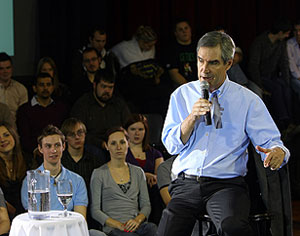 |
| Liberal leader Michael Ignatieff responding to questions from students. (Nick Pearce Photo) |
Troubled by growing disillusionment with Canadian politics, Liberal Leader Michael Ignatieff says he's concerned about Canada's future. That’s why he was at Dalhousie Monday afternoon, to "talk to those who are the future."
Citing low participation rates in young voters, Mr. Ignatieff spoke to the audience, mostly of students, about the responsibility each person has as a Canadian to be politically engaged. However, he said it’s his responsibility as a political leader to give people something to believe in.
Embarking on a cross-country campus tour, Mr. Ignatieff pointed to climate change and the global recession as some of the pressing challenges facing Canadians. "We’re not just in a recession but a restructuring of the global economy," he told the students.
"In this new world, carbon has a price and we can’t just use our atmosphere as a garbage dump. Our economic future will be defined by the price of carbon."
After briefly outlining these challenges, he spent the next 45 minutes fielding questions from the audience. While the economy, climate change and post-secondary education were hot topics, not surprisingly, Prime Minister Stephen Harper's decision to prorogue parliament was top of mind when the first question was asked.
"(Stephen Harper) is doing it to hide details of the Afghan torture allegations," said Mr. Ignatieff, when asked his thoughts on the decision. "He called the governor general on New Year's Eve taking a gamble on Canadian cynicism – this is what gives politics a bad name."
Pointing out the $13 billion surplus the Liberals had amassed when they left office compared to a $58 billion deficit under the Conservatives, the Liberal leader responded to economic recovery questions by saying Canada remains in decent economic shape and that education will be a major issue going forward.
"We need to control expenditures, but we don't want to get out of deficit by cutting education," he said, referring to the prime minister's decision to cut the Canadian Council on Learning this past Friday. "We need to invest in education, that is where the future is."
On renewable energy, Mr. Ignatieff said Canada is not doing as well as it could be. "Canada invests less in renewable energy than Alaska," he said. "This means Stephen Harper trails behind Sarah Palin," he joked.
Turning to his serious response, he believes Canada shouldn't wait for the United States and go ahead with a cap and trade policy that clearly outlines energy consumption rules and regulations and that will gradually decrease Canada's use of fossil fuels. He also pointed to regional strengths like tidal power in the East, to diversify energy sources.
He was not immune to the difficult questions either. A student familiar with recent parliamentary voting asked Mr. Ignatieff why his party sided with the Conservatives in voting against Bill C311, the Climate Change Accountability Act.
"We thought it was flawed in that it gave the federal government too much power over the provinces," he explained. "It was almost to the point of being unconstitutional."
He was also asked how Canadians were supposed to believe in his political leadership on the same day his party launched attack ads against the prime minister's decision to prorogue parliament.
"We’ve got to be honest here. Political systems are adversary systems. It’s appropriate for us to attack on policy," he responded. "You know I had my patriotism attacked, I’ve had my devotion to Canada attacked, I’ve been told I’m just visiting, it's all garbage."
"I’ve had four years of it that I don’t like so much. But attacking Mr. Harper for his policies? Attacking him for shutting down Parliament? – I make no apologies for going after him on policy issues." Mr. Ignatieff said the Prime Minister believes politics is "war" while he believes that politics is about "persuasion."
As for post-secondary education funding, the former professor had only ideas. While he personally believes schools should be rewarded financially based on the amount of students they bring in, regardless of where they are from, he sees political tensions that would arise from moving away from the current, per capita funding system, but didn't go into how those issues could be dealt with. He said he would like to have a dedicated post-secondary education transfer designated in the treasury separate from individual provinces contributions so no one gets too much power. His hope is that more research would be funded and a national strategy on research could be accomplished.
After concluding to applause from the crowd that packed the McInnes room, which had been cut in half for the event, Mr. Ignatieff accepted a Dalhousie T-shirt and a case of Keith's from the Dalhousie Young Liberals and ended with a bit of humour. "My favourite thing about this job is getting all the wonderful gifts, and this is the best one I've received in a long time," he said, flashing his now trademark grin.
